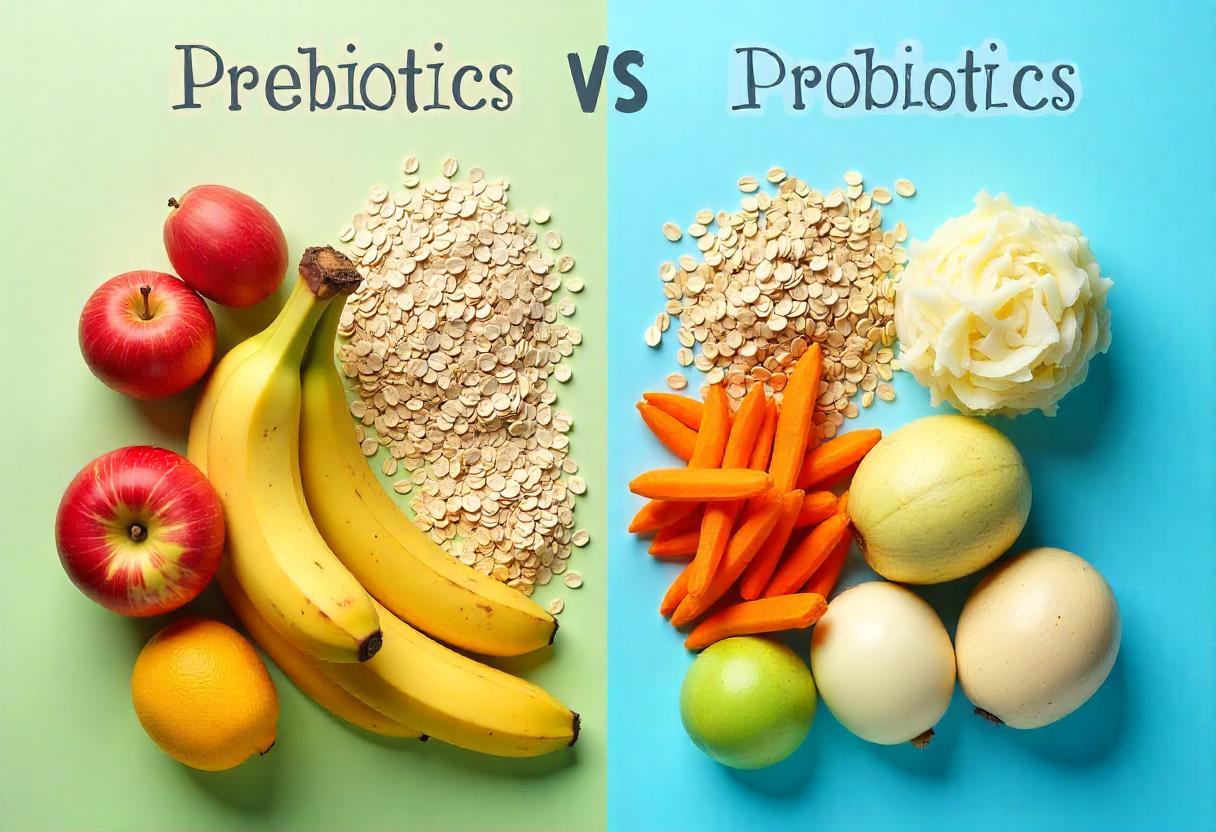
Did you know that around 70% of your immune system is housed in your gut? With gut health linked to your overall well-being, understanding how to nourish it is essential. Prebiotics and probiotics play vital roles, but they are not the same. This article explores the key differences between them and their contributions to gut health.
Understanding Prebiotics: Food for Your Good Bacteria
What are Prebiotics?
Prebiotics are non-digestible food components that feed beneficial bacteria in your gut. They act like fertilizers, helping good bacteria thrive. Common types of prebiotics include:
- Inulin: Found in chicory root, onions, and garlic.
- Fructooligosaccharides (FOS): Present in bananas, artichokes, and asparagus.
- Galactooligosaccharides (GOS): Found in milk and legumes.
Foods rich in prebiotics are key to maintaining a healthy gut ecosystem.
How Prebiotics Work
Prebiotics selectively nourish good bacteria, boosting their numbers and activity. When you consume them, they ferment in the gut and produce short-chain fatty acids. These compounds play a role in various health benefits. For instance, a study published in the Journal of Nutrition highlighted how prebiotics can improve gut microbiota diversity.
Benefits of Prebiotics
- Improved Digestive Health: Regular consumption can reduce symptoms of constipation and bloating.
- Enhanced Immunity: A healthy gut microbiota supports immune functions, according to research in Nature Reviews Immunology.
- Other Health Benefits: Some studies suggest prebiotics may help with weight management.
Understanding Probiotics: Live Beneficial Bacteria
What are Probiotics?
Probiotics are live microorganisms that provide health benefits when taken in adequate amounts. They help maintain a healthy balance in your gut. Common probiotic strains include:
- Lactobacillus: Found in yogurt and fermented foods.
- Bifidobacterium: Present in dairy products and supplements.
Probiotic supplement usage has surged, with market trends showing a significant increase over the past few years.
How Probiotics Work
Probiotics operate in several ways. They produce beneficial substances, compete with harmful bacteria, and help enhance the gut barrier. Different strains offer various health benefits, emphasizing the need for specific strains based on your health goals.
Benefits of Probiotics
- Digestive Health Improvement: Evidence shows probiotics can alleviate symptoms of conditions like Irritable Bowel Syndrome (IBS).
- Immune System Support: Probiotics help modulate the immune response, contributing to overall health.
- Other Health Benefits: Some studies link probiotics to improved mental health and mood stabilization.
Prebiotics vs. Probiotics: A Side-by-Side Comparison
| Feature | Prebiotics | Probiotics |
|---|---|---|
| Definition | Non-digestible fibers | Live beneficial bacteria |
| Function | Feed and promote growth of good bacteria | Provide health benefits directly |
| Sources | Vegetables, fruits, whole grains | Fermented foods, supplements |
| Benefits | Improve digestion, immunity, and weight management | Enhance digestive health, immunity, mental health |
Synergistic Effects
Prebiotics and probiotics can work together to optimize gut health. Prebiotics create a favorable environment in the gut, allowing probiotics to flourish. Research suggests that this combination can enhance digestive and immune health.
Choosing the Right Option
Deciding between prebiotics, probiotics, or both depends on your personal health goals. Consider your dietary preferences and any ongoing health issues. Consulting with a healthcare professional can guide you in making the best choice.
Incorporating Prebiotics and Probiotics into Your Diet
Food Sources of Prebiotics
Including prebiotic-rich foods in your diet is simple. Some options are:
- Bananas
- Garlic
- Onions
- Asparagus
Data indicates a large portion of the population does not consume enough dietary fiber, which includes prebiotics.
Food Sources of Probiotics
Probiotics can be found in:
- Yogurt
- Kefir
- Sauerkraut
- Kimchi
Despite the health benefits, many people do not consume adequate amounts of these foods.
Supplement Considerations
When choosing prebiotic or probiotic supplements, look for high-quality options. Check for live strains in probiotics and confirm that prebiotics are effective for your needs. Quality varies widely, so read labels carefully.
Conclusion
Understanding the differences between prebiotics and probiotics is crucial for improving gut health. Both are essential for overall well-being, offering unique benefits that enhance digestion, immunity, and even mental health. Start incorporating more prebiotic and probiotic foods into your daily meals for a healthier gut. Consult a healthcare professional before adding supplements to your routine for personalized advice.






